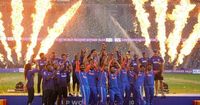Mohsin Naqvi, a man wearing many hats as Pakistan’s Interior Minister, chief of the Pakistan Cricket Board (PCB), and President of the Asian Cricket Council (ACC), is now at the center of a cricket and political storm that shows no sign of abating. The latest development? He’s set to receive the Shaheed Zulfiqar Ali Bhutto Excellence Gold Medal, a recognition for his "principled and courageous stance" during the trophy handover controversy that marred the Asia Cup 2025 final. But what really happened on that fateful night in Dubai, and why has this post-match drama become the talk of both sporting and political circles?
The Asia Cup final, held on September 29, 2025, at the Dubai International Stadium, was supposed to be a celebration of cricketing excellence. Instead, it became a flashpoint in the already tense relationship between India and Pakistan. On the field, India clinched a five-wicket victory over Pakistan, with Suryakumar Yadav leading his side to a hard-fought win. But as soon as the last ball was bowled, it was clear that the real contest was only just beginning.
During the post-match ceremony, Indian players made headlines by refusing to accept the Asia Cup trophy from Mohsin Naqvi. This move, widely interpreted as a political snub, was the culmination of weeks of simmering tensions. India had already enforced a strict "no handshake" protocol with Pakistani players throughout the tournament, and Naqvi’s repeated anti-India statements and provocative social media posts only deepened the divide. According to Advocate Ghulam Abbas Jamal, President of the Sindh and Karachi Basketball Associations, Naqvi’s actions in retaining the trophy "restored national pride" for Pakistan at a moment when the country’s dignity was perceived to be under threat.
"This is not just about cricket," Jamal said, as quoted by The Independent. "It is about dignity, sovereignty, and the refusal to bow under pressure." The sentiment resonated across Pakistan’s political and sporting communities, with many praising Naqvi’s unwavering stance. Organisers of the Shaheed Zulfiqar Ali Bhutto Excellence Gold Medal see the award as both a symbolic gesture of respect and a pointed message of national pride, especially in the face of India’s perceived slight.
Meanwhile, the fallout from the trophy handover debacle continued to ripple through the cricketing world. Naqvi, refusing to be sidelined, walked away from the stadium with the Asia Cup trophy in hand. He later took to social media to clarify his position, stating, "I did nothing wrong, and I did not — and will not — apologise to the BCCI." In a pointed message, he added that the Indian team was "welcome" to collect the trophy from the ACC headquarters if they truly wished to do so.
The Board of Control for Cricket in India (BCCI), for its part, was quick to raise the issue at the ACC’s annual meeting and signaled its intention to escalate the matter to the International Cricket Council (ICC) during its upcoming session in November. The BCCI’s stance was clear: it would not participate in a trophy presentation involving Naqvi, especially after his inflammatory remarks and the political undertones that had overshadowed the tournament.
According to a report in Cricbuzz, Naqvi has since offered to hand over the Asia Cup medals to India, but with a caveat that’s unlikely to be entertained by the BCCI. He insisted that the Indian team could receive their medals only if a formal function was organised where he could personally present the awards. Given the current climate and the BCCI’s firm position, such a function seems improbable, leaving the impasse unresolved.
The presentation ceremony itself was chaotic. The post-match events were delayed by 45 minutes as officials scrambled to find a solution. Indian players Abhishek Sharma, Tilak Varma, and Kuldeep Yadav did receive their individual awards, while Pakistan’s squad collected their runners-up cheques and medals. But the main prize—the Asia Cup trophy—remained conspicuously absent from Indian hands. Simon Doull, the event’s presenter, summed up the mood with his announcement: "Ladies and gentlemen, I have been informed by the ACC that the Indian cricket team will not be collecting their awards tonight. So that does conclude the post-match presentation."
The controversy didn’t come as a complete surprise to insiders. Even before the final, it was widely anticipated that India would refuse to accept the trophy from Naqvi. The Indian camp, after consulting with BCCI officials in Mumbai, decided to avoid any interaction with the ACC head. The ACC, caught off-guard, failed to preempt the situation, and the entire cricketing world watched as the saga unfolded live on television.
What’s fueling this standoff? The answer lies in the broader context of India-Pakistan relations. The Asia Cup final took place in the shadow of the Pahalgam terror attack, which claimed the lives of 26 Indian tourists and was attributed by Indian authorities to militants based in Pakistan. In response, India launched military strikes under "Operation Sindoor," targeting alleged camps across the border. Against this backdrop, every gesture and every word took on heightened significance, and the trophy handover became a proxy battlefield for national pride and political messaging.
Now, as plans move forward for the formal ceremony to honor Naqvi in Karachi, the spotlight remains firmly on the man at the center of it all. PPP Chairman Bilawal Bhutto Zardari has been invited as the chief guest, though the date is yet to be confirmed pending his availability. A special committee, chaired by Sindh Basketball Association head Khalid Jameel Shamsi and with Ghulam Muhammad Khan as secretary, has been established to oversee the event. The organizers hope the award will send a clear signal: Pakistan will not be cowed, either on the cricket field or the diplomatic stage.
For cricket fans, however, the lingering question is when—if ever—the Asia Cup trophy will find its way to Mumbai. With both sides unwilling to compromise, the stalemate looks set to continue. The ACC’s authority has been called into question, and the ICC’s November session looms as the next battleground in this ongoing drama.
As the dust settles, one thing is clear: the 2025 Asia Cup will be remembered as much for its off-field controversies as for the cricket played on the pitch. Mohsin Naqvi’s defiant stand has made him a hero to some and a villain to others, but there’s no denying that he’s left an indelible mark on the game. Whether the trophy handover saga will finally be resolved remains to be seen, but for now, the story continues to unfold, one statement—and one medal—at a time.


